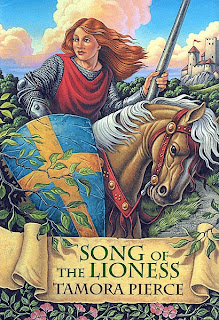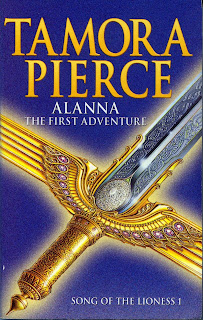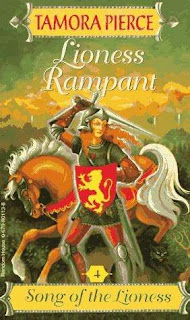Do you ever just stop and ask
yourself what you’re doing? Like, am I actually helping the situation here? Is
what I’m doing worthwhile? Or am I screaming into the void of human
indifference? Worse, am I actively making the situation more frustrated?
I asked myself all of those
things about half an hour ago, thanks to this article, and I can now, after a
moderate amount of reflection, answer that I’m awesome and yes what I’m doing
is in fact important and worth my time. And here’s why.
So, if you didn’t click the link
above, I guess I’ll be nice and tell you what it is. It’s a link to an article
on The New Statesman about Strong
Female Characters. Actually, the article is called “I Hate Strong Female Characters”, and the author, Sophia McDougall, makes a pretty valid point that
due to the overwhelming maleness of pop culture, any woman who gets a larger
role immediately becomes representative of the entire gender. She becomes a
Strong Female Character – if she’s written by “progressive” writers, that is.
As a Strong Female Character,
her peers are all men, she is forced to use language and physical action that
differentiate her from all other “weak” women, and her specialness is enforced
by us, the public, who refer to her as “strong”, therefore implying that all
other women, who maybe can’t throw a punch that shatters a brick wall and don’t
have spectacular abs, are weak.
McDougall’s point is totally
valid, and I completely agree. With most of it.
But here’s the thing. I don’t
think this means we should stop talking about Strong Female Characters. I think
it means we have to redefine what we see as strong.
And I also think that yes, it’s
bad that we have to single out female characters as especially well written and
deserving of our praise, therefore implying that all other female characters
are not deserving of our praise, but, well, we do. Because they aren’t.
Seriously. Most of them suck.
So, without further ado, welcome
back to Strong Female Character Friday. Today we’re going to talk about the
Strong Female Character-iest character I could think of: Alanna from the Song of the Lioness quartet by Tamora
Pierce.
Those of you who’ve read the
books are probably groaning right now, because you know it’s true. As much as I
love these books, and I really do love them, Alanna is kind of a cheat of a
character because she’s so clearly written to be a role model for girls
everywhere. She’s like the most blatant attempt at a feminist icon I’ve ever
seen. And you know what?
I love her anyways.
Alanna is a young lady of noble
birth who doesn’t want to get sent off to a convent when she turns ten. Her
father has determined that she has to learn magic and her brother should learn
how to be a knight. But Alanna and Thom (her brother) have other ideas, and
contrive to switch places. They forge a paper saying that Alan will go train to
be a knight, and Thom will go learn magic. Alanna effectively ceases to exist.
So, yeah, it’s a well written
series of novels about another plucky young girl who dresses as a boy in order
to have a life of adventure in a medieval-esque fantasy land. It’s really easy
to actually dismiss the books because they’re so…expected. But then you have to
realize, they’re expected, because these are the books that created that
expectation.
No, seriously, these are the
books that made this whole thing a trope.
And that’s where this all
actually gets more complicated, and Alanna starts to become a really intriguing
character. It’s not that she’s a better fighter than all the boys. She isn’t.
She’s actually a whole lot worse, as a result of being smaller, younger, and
less trained. She doesn’t really have a clue what she’s doing, and she nearly
gets herself killed kind of a lot.
Now, this is a young adult book,
and she is the hero, so obviously she learns to fight, and of course she
becomes one of the best in her class at it. Alanna has adventures, fights
against the absurdly obviously evil uncle, and goes on to become the first
female knight in Tortall in centuries, and then further on to become a true
hero and the stuff of legend. It’s all very good, and very compelling.
With such a standard story,
though, it’s easy to think that Alanna’s virtue as a Strong Female Character is
that she’s, well, strong. She’s easily identified as strong, a woman in a man’s
world. Most of her friends are men. She excels, and for half the story almost
no one knows she’s a woman. She excels in spite of her gender.
Except not really. If you think
about it, Alanna excels in these books precisely because of her gender. And largely because of her decision to hide
it.
This is what makes me actually
really love this series. Alanna, god-modded though she is, has valuable insight
to offer precisely because she’s been in hiding for half her life. She’s a
liar, so she knows what liars look like. She’s used to being underestimated, so
she tries not to underestimate others. She’s a criminal for what she’s done, so
she doesn’t judge criminals too harshly.
What I’m saying is that instead
of making her a great character who happens to dress up as a boy to have
adventures, Pierce chose to make Alanna a great character because she dressed up as a boy to have adventures. An Alanna
without that great conflict in her life would be a really dull person. And I
like that.
I also like that she sometimes
forgets that her choices are not everyone’s choices.
It comes up later in the series,
because for the first two books she very rarely runs into other women (which
makes sense), but Alanna really has no idea how to act around women. More than
that, though, she has no idea how to reconcile their life choices with her own.
When she sees women who have gotten married, had children, lived their expected
lives, Alanna gets awkward. She doesn’t know what to do. She doesn’t know if
she should be sympathetic, or if they are perfectly happy and got what they
wanted.
Sometimes she’s even kind of a
bitch about it.
This mostly comes out in the
third book, The Woman Who Rides Like a
Man, which chronicles Alanna’s first year as a knight. She gets adopted
into a tribe of nomads in the southern desert of Tortall, and blunders her way
into a position as the tribe’s shaman. She’s the first woman to be shaman
pretty much ever, but the tribe excuses it by treating her like a man.
Alanna’s uncomfortable with that
idea, but more uncomfortable with the idea of acting like a woman of the tribe,
since women of the tribe aren’t given much of a voice, and wear veils, and keep
to the shadows.
Alanna judges the women. She
thinks they’re weak. She assumes, wrongly, that these women are fearful of
their men, or they would rise up and take their “rightful” place. Alanna
assumes that these women want what she wants, exactly the way she wants it. And
she’s wrong.
Some stuff happens in the story,
and she ends up with two young girls apprenticing under her to become the
tribe’s shamans. Both the girls have been raised in the tribe their whole
lives, and those lives have been pretty harsh. They weren’t accepted. They
struggled. And now they have a place of honor, and get to sit with the men.
So Alanna absolutely cannot
understand why both the women choose to keep wearing their veils.
They don’t have to, she insists.
They have the same status as men now, they can do what they want. The women
reply that if they can do what they want, then they can keep wearing the veil,
can’t they? And Alanna just can’t deal.
I really loved this section of
the book, simply because it’s a tricky subject for us today, and one that has
no easy resolution. Clearly Alanna is wrong for trying to enforce her social
mores on women who are perfectly happy with the mores they already have, but so
too should she challenge those values, since those same values caused these
women to have unhappy childhoods. On the one hand, the argument is important.
On the other, we have to accept others’ cultural practices.
I love this part because it
doesn’t get resolved. Alanna stays unhappy with the situation, and the women
keep their veils. There is no easy answer, and Alanna realizes that she’s being
a poop and judging the women of the tribe harshly. But this doesn’t mean she
agrees with everything they do.
In a way, I think that’s why I
actually like her as a SFC. Alanna is strong, and opinionated, and complicated,
and very sure of herself and her place in the world, and all of that is good
and fine. But she’s also sometimes wrong. And she sometimes doesn’t like
recognizing that.
For all that she’s special and
powerful and pretty and a good fighter and everyone likes her, Alanna’s still
sort of a bitch and she doesn’t know what she’s doing and she ran away from a
life she was afraid of because she didn’t know how to handle the responsibility.
She looks like a stereotype, but the instant you dig deeper, you realize she’s
real.
That’s how I feel about this
whole thing. Strong Female Characters. That article.
I agree that talking about
Strong Female Characters and defining one thing as strong and others as weak is
reductivist and unhelpful. I totally agree that the whole “princess knows kung
fu” thing is stupid and annoying and also unhelpful. And I definitely do think
that constantly pointing at interesting women suggests that most women are not
interesting. But.
That does not mean that we
should stop talking about the issue. It means that we should have the debate.
Loudly, and in public. Do we wear face veils or do we live as men? Is either
better? Or is there a third path? I’m just saying, let’s talk about this. A
lot.








I read this series last time you talked about it,... loved it then, love it now...
ReplyDeleteThat makes me super happy to hear!
DeleteI've been hearing about these books forever! I should read them.
ReplyDeleteAlso, just wanted to say I really, really like this blog. Followed a link from Feministe and it is totally rad to read thoughtful commentary on media with a feministy/fangirly bent.
These books are awesome and you should totally read them. For reals.
DeleteAnd thank you! That makes me happy to hear. :DDD